Barnet UNISON writes to Barnet School Heads on safety at work

To view letter click on link below
2020.05.18 Letter to Head Teacher re Government’s plans to increase numb…


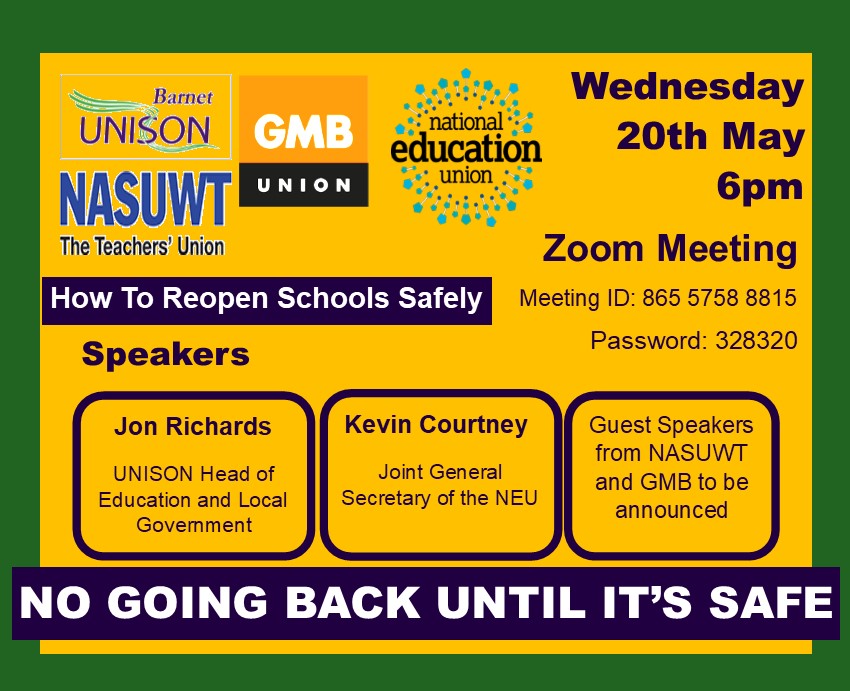
“How To Reopen Schools Safely”
Speakers: Jon Richards (UNISON), Kevin Courtney (Joint General Secretary NEU) GMLB speaker to be confirmed, NASUWT speaker to be confirmed
Joining details
https://us02web.zoom.us/j/86557588815?pwd=WEZGaVVkaks2ZTI5SFppTHNzL04wdz09
Meeting ID: 865 5758 8815
Password: 328320
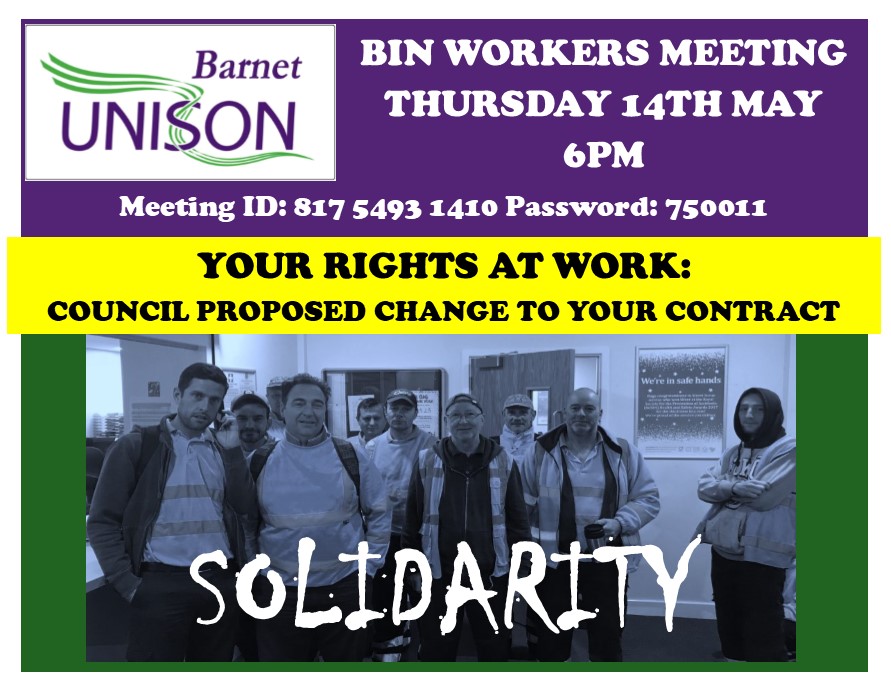
https://us02web.zoom.us/j/81754931410?pwd=UGRYVmlJVC9TbVF5eTFDVFhXVGJBZz09
Meeting ID: 817 5493 1410
Password: 750011
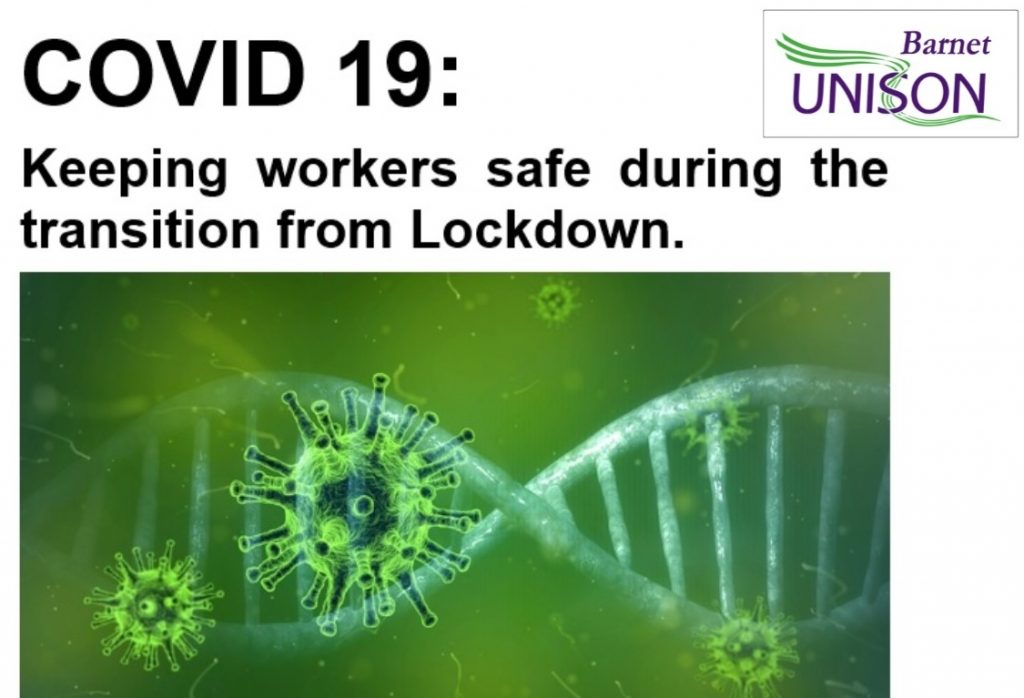
Barnet UNISON has submitted the following report which sets out our list of demands for full Trade Union engagement in the transition from Lockdown.
“It is really important at this time that workers trust that their employer ensures the workplace is safe. COVID 19 has brought risks to our members’ lives in a way many of our members have never faced before. Therefore, it is important not just to say the workplace is safe, BUT to demonstrate that is safe by being transparent and open and ensuring risk assessments for every work place are easily available for the workforce to read. On Tuesday 5 May 2020, we submitted our report to Barnet Council Chief Executive as the first step to work to ensure all our members are safe at work. We will report back on the negotiations over the coming days and weeks.” (John Burgess, Branch Secretary, Barnet UNISON)
Some of our proposals set out in the report are:
1. The Council to inform and consult with the Trade Unions in a full and timely manner on the transition from Lockdown. By engaging with the Trade Unions the Council can receive our support in the process, and help build workforce support for changed ways of working such as working from home, social distancing measures and deployment of Personal Protective Equipment (PPE).
2. The Council to ensure that protective measures are in place for workers most vulnerable to Covid-19, pregnant women, new mothers and employees sharing households with people requiring shielding.
3. Covid-19 Risk Assessments to be in place relating to specific worksites and work tasks. The Council should consult and obtain agreement with the Trade Unions on these Risk Assessments. No worksites or tasks to be engaged until such Risk Assessments are in place following agreement with the Trade Unions. Risk Assessments to be accessible to all Council employees.
4. Increased stringency and frequency of cleaning of workplaces and equipment during the transition from Lockdown.
5. Social distancing to be in place at work sites, with clear guidance given to workers. Buildings should not be open to the public without strict and enforceable social distancing measures in place, following consultation and agreement with the Trade Unions.
6. To reduce the risk of infection the Council should consider and implement changes to the layout of workplaces, adjusting working patterns, alternating sections of the workforce on sites, and staggering travelling times. The Trade Unions to be consulted with on any such changes.
7. In line with Section 44 of the Employment Rights Act 1996 the Council will not submit any worker refusing to work in an unsafe workplace to Disciplinary or other punitive measures. It recognises workers have the right to withdraw from and refuse to return to an unsafe workplace, and that they have legal protection from dismissal, disciplinary or any other detriment for raising a health and safety issue.
8. PPE must be provided where necessary, and no-one should be asked to re-use PPE inappropriately.
9. Employees to receive instruction on the safe use, maintenance and cleaning of PPE as necessary.
10. Equalities Impact Assessments to be in place for the transition from Lockdown. Across the UK Black and Ethnic Minority workers have suffered disproportionate harm from the impact of the virus. The Council must seek to prevent this disproportionate impact and comply with its public sector equality duty.
11. The Council to inform workers about the availability and criteria of Covid-19 testing and to support workers in obtaining such testing when criteria are met.
Click on link below to read the UNISON report.

“Dear Head,
I hope that you are well and managing to cope under these extraordinary circumstances we all find ourselves in.
We, the Trade Union Leads, are writing to all Heads in response to the ongoing speculation as to when schools may be asked to open up again especially as a vaccine or cure is not likely to available in this calendar year and, therefore, it is likely that we will need to continue social distancing.
Our concerns are both for the children and the staff.
We want to ensure the schools are as safe as possible in terms of dealing with COVID 19.
Our members are very worried about schools re-opening before it is safe. They have noted that the provision of PPE for NHS workers and Care workers has been a worrying and ongoing issue, being played out on national media on a daily basis. Whilst assurances have been made that supplies of PPE for the staff will be delivered day after day by senior members of the Government it is clear for all to see that this has not happened and it continues to be a serious issue for staff. Furthermore our members have watched with horror when news broke last week that PPE supplies were running out and that sadly Public Health England were revising their guidance down in response to supply rather than the level of risk to the workforce and patients.
It is with this back drop that we want to ensure that when schools open, the school is able to assure staff and parents that the workplace will be a safe place for all.
To this end we are asking all schools what measures they currently have in place in terms of the following:
Please feel free to contact me if you have any queries or believe we may be able to support your school and staff during this national emergency.
Stay Safe
Regards
Barnet Trade Unions”
If you have any questions or concerns email the branch at
You can keep up to date with Barnet UNISON here on our
Website here https://www.barnetunison.me.uk/wp/
Facebook https://www.facebook.com/BarnetUNISON/
Twitter https://twitter.com/barnet_unison
 Dear Barnet UNISON members,
Dear Barnet UNISON members,
The lockdown is clearly having an impact on our mental health and wellbeing.
Below is a service called Able Futures who provide some excellent services for staff, some of our Barnet UNISON members are already using and providing some positive feedback.
Able Futures delivers the Access to Work Mental Health Support Service which can give nine months support from a mental health professional at no cost.
If staff are experiencing issues such as anxiety, depression, grief or stress, or are struggling to deal with problems such as debt, disrupted sleep or relationship breakdowns that may be affecting mental health, Able Futures can help you build resilience, tackle issues, feel better and learn new ways to manage your mental health throughout the ups and downs of life.
There’s no waiting list and you can apply online or by calling 0800 321 3137.
Below are some Able Futures resources and information from other agencies.
https://able-futures.co.uk/covid-19-coronavirus/coronavirus-and-anxiety/
Able Futures continue to offer a service, adapted to offer all telephone and online support now to avoid contact.
If you are furloughed, you are still entitled to support, as well as any family members that may be eligible.
Signing up is just a few clicks and only takes a few minutes via the Able Futures website:
https://able-futures.co.uk/covid-19-coronavirus/
You may also find excellent resources and advice on the following websites:
Young Minds for the younger people in our communities:
https://youngminds.org.uk/find-help/looking-after-yourself/coronavirus-and-mental-health/
This organisation can offer training and awareness:
https://actiontopreventsuicide.org/
Mental Health Foundation, some excellent information:
https://mentalhealth.org.uk/coronavirus
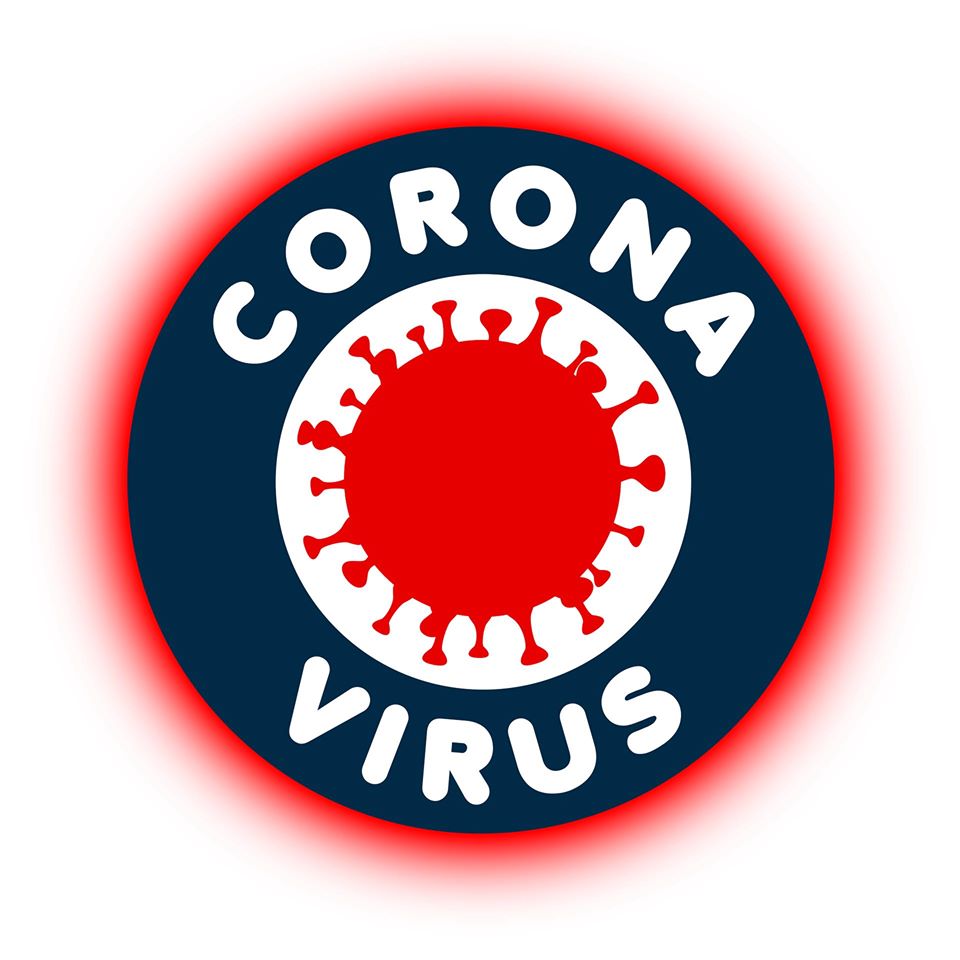
Recommended PPE for primary, outpatient, community and social care by setting, NHS and independent sector
Date: 14 April 2020.
The PPE guidance takes you to a table showing the types of PPE you need depending on your workplace.
For staff working in care homes you need to read to look at the fourth column down on the left entitled:
“Community and social care, care home, mental health inpatients and other overnight care facilities e.g. learning disability, hospices, prison healthcare.”
If you look at the guidance it states:
What do they mean by eye/face protection?
What do they mean by Single Use?
“4.Single use refers to disposal of PPE or decontamination of reusable items e.g. eye protection or respirator, after each patient and/or following completion of a procedure, task, or session; dispose or decontaminate reusable items after each patient contact as per Standard Infection Control Precautions (SICPs).”
What do they mean by Sessional use?
“5.A single session refers to a period of time where a health care worker is undertaking duties in a specific care setting/exposure environment e.g. on a ward round; providing ongoing care for inpatients. A session ends when the health care worker leaves the care setting/exposure environment. Sessional use should always be risk assessed and considered where there are high rates of hospital cases. PPE should be disposed of after each session or earlier if damaged, soiled, or uncomfortable.”
What do they mean by risk assess?
“8. Risk assessed use refers to utilising PPE when there is an anticipated/likely risk of contamination with splashes, droplets or blood or body fluids.”
For more details click on link to Government web site below

https://www.barnet.gov.uk/internal/mental-health-and-wellbeing
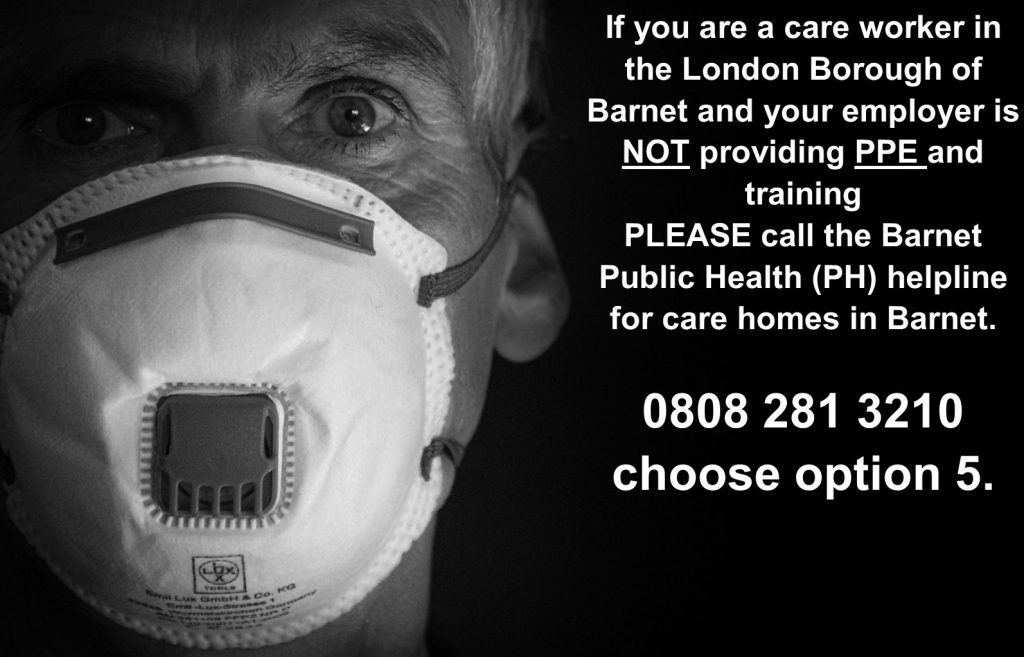
If you are a care worker in Barnet please please click on the link below for details of the type of PPE you should be wearing in your workplace.
As coronavirus (also known as COVID-19) continues to spread, we recognise that our organisation needs to adapt its ways of working.
We want to help reduce the spread of coronavirus and safeguard the welfare of our staff during the coronavirus outbreak, while continuing our operations as normally as possible.
This policy explains what temporary changes we are making to our usual policies and procedures on sickness absence, flexible working, travel, and annual leave during the global health crisis.
Sickness absence
Sickness absence reporting
What is our normal policy?
Under our normal sickness absence policy, if you fall ill and cannot attend work, you would be required to:
What is changing temporarily?
During the coronavirus situation, it is vital that you do not attend work if you fall ill and experience any common coronavirus symptoms. These are:
You should still notify your line manager of your absence before you are due to start work, or as soon as possible if that is not practical.
However, we recognise that you may be legitimately absent without having written medical evidence (typically, a fit note from your doctor). If you are given medical advice to self-isolate, we will not ask you to provide written medical evidence after seven calendar days’ absence.
This is because public health advice is that, if you show symptoms, you should avoid going to your doctor or a hospital to prevent infection from spreading. You may have been given medical advice via telephone from NHS 111 to self-isolate.
You will still be expected to:
Given the coronavirus situation, you must make sure that your contact details are up-to-date on iTrent and your line manager has a telephone number and email address where they can reach you if you are in self-isolation.
Acceptable levels of absence
What is our normal policy?
Under our sickness absence policy, the formal procedures for managing sickness absence may be triggered as a result of:
in the previous 12 months.
What is changing temporarily?
If you are given medical advice to self-isolate (for example from NHS 111), or we ask you to self-isolate, we will not take this absence into account when determining whether or not we are taking formal action under our sickness absence management procedure.
Sick pay
What is our normal policy?
You would normally receive, if eligible, statutory sick pay (SSP) where:
What is changing temporarily?
You will be paid full pay if:
Flexible working
Requests for flexible working
What is our normal policy?
Under our flexible working policy, you can normally agree informally with your line manager to one-off or short-term changes to your working patterns or periods of homeworking.
However, if you wish to change your working patterns or work from home for an extended period, we normally ask you to make a formal request for flexible working and follow the procedure set out in our policy on employees requesting flexible working.
What is changing temporarily?
As long as the organisation’s operational needs continue to be met, you will be able to:
for an extended period without having to follow our formal procedure. You can agree informally with your line manager to these changes.
You should speak to your line manager if you wish to take advantage of either of these options, or any other flexible working options that may help you at this time. However, the decision as to whether or not to agree to your request for flexible working remains with your line manager.
Once agreed, the temporary flexible working arrangement will continue until further notice. If circumstances change, your manager will discuss with you any adaptations to, or the withdrawal of, the flexible working arrangement, with the final decision remaining with your manager.
Requirement to work remotely
What is our normal policy?
Except by prior agreement with us, we do not normally require you to work remotely for an extended period.
There is normally no expectation that:
What is changing temporarily?
Given the current global health situation, you may be asked to work remotely at short notice. This could be the case if our workplace closes unexpectedly as a precaution or public health measures, such as an area-wide lockdown, are introduced.
This could mean working from home, although you may have the option to work remotely from one of our other work sites if it remains open.
If it is not possible for you to work from home, you should discuss your options with your line manager.
You should ensure that, where possible, you take your laptop home with you after work each day.
You should contact the IT department if you have any queries about the remote-working system.
Travel
Non-work-related travel
What is our normal policy?
We do not normally have any rules around staff travelling outside work.
What is changing temporarily?
If you have been in a restricted area since the beginning of March 2020, you must inform your line manager immediately.
If you plan to travel to a restricted area in your own time, for example on a holiday or for family reasons, you must inform your line manager before you depart of where you are going.
You must not come to work on your return. Even if you have no symptoms, we will ask you to self-isolate for 14 days after your return from the restricted area.
On your return from a restricted area, your first step should be to visit the 111.nhs.uk website, where you can get further medical advice via telephone. You should do this even if you do not have any symptoms.
If possible, you should avoid going to your doctor or a hospital to prevent infection from spreading.
Annual leave
Changing your holiday plans
What is our normal policy?
Once you have booked annual leave, we normally allow you to cancel or change annual leave only in limited circumstances. These circumstances include where:
What is changing temporarily?
During the coronavirus situation, you may change your mind about travelling, or be unable to travel to your planned destination, and may wish to cancel or change annual leave that you have already booked.
If you would like to cancel or change planned leave, please speak to your line manager. We may allow you to change or cancel booked holiday, taking into account the coronavirus situation. However, this will continue to be a decision for your line manager, depending on the circumstances.
For example, if we have arranged cover for you, or arranged shift patterns on the basis that you will be on leave, we may require you to take the leave as booked.
Unused annual leave
What is our normal policy?
Our organisation’s holiday year runs from 1 April to 31 March.
Normally, we require you to take your holiday entitlement in the relevant holiday year and we allow you to carry over no more than[five days’ annual leave into the following leave year.
What is changing temporarily?
We recognise that you may be unable to take your remaining annual leave before the end of the leave year. For example, you could have an increased workload because of the coronavirus situation, or you may have cancelled or changed planned annual leave.
We are suspending our usual rule that / you can carry over no more than five days’ annual leave into the following leave year
While you should endeavour to take your holiday entitlement in the relevant holiday year, you should speak to your line manager if you think that you will be unable to do so.
As long as your line manager agrees, the annual leave can be taken later. The timing is a matter for discussion between you and your line manager.